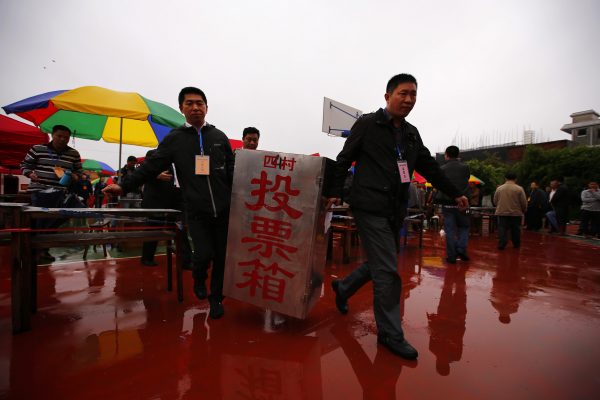Moreover, due to the uneven implementation of the election law, there is a wide variation in village elections across China. Indeed, enacting popular elections for government heads above the village level may be putting the cart before the horse. Direct elections should not occur without significant legal reforms first.
The Organic Law of Villager Committees that allows villagers to directly elect committee members was enacted in 1988 on a trial basis and then became law in 1998. At first glance, the Organic Law seems to represent a move towards grassroots democratisation in China. But one of the aims of the law is to shift the costs of supervising village leaders from higher officials to local residents.
In 1988, there were over 700,000 village committees and it was nearly impossible for authorities at the national and even subnational governments to monitor these cadres. Village elections intend to provide villagers the opportunity to monitor and sanction local leaders.
Village committee members also have to implement a wide range of state directives including unpopular policies such as family planning and tax collection. Traditionally, rural administrative units have faced challenges getting villagers to comply with state policies. While village elections appear as democratic experiences, the logic behind them is that rural residents will be more willing to comply with local leaders they elect rather than appointed ‘outsiders’. The compliance and monitoring aspects reflect a more practical reason for village elections.
While most villages in China had experienced local elections by the early 2000s, it was clear that the Organic Law was unevenly implemented throughout the countryside. This is due to town government resistance to the law. Town officials depend on village cadres to implement critical policies such as revenue collection and birth control. But ‘free and fair’ village elections reduced town government authority to select and ensure compliant village cadres.
One way town leaders manipulate the village election outcome is through the nomination process. If town leaders can control the candidate list then, even in a competitive election, they can ensure a satisfactory outcome.
A contradiction that became apparent in the 1990s and 2000s was the potential conflict between the popularly elected village leader and the appointed party secretary. This reflects a Chinese saying that ‘there cannot be two suns in the sky’.
In some cases, the popularly elected leaders, in the name of protecting their constituents, would attempt to block or change unpopular policies, particularly the collection and use of local revenues. Party secretaries, who are also villagers and typically appointed by the town party committee, may on the other hand try to strike a balance between town and village interests. One solution to the ‘two suns’ problem is having the appointed party secretary also serve as an ‘elected’ leader. Dubbed the ‘one shoulder’ model, this has been adopted by a number of villages across China.
When the town government interferes in the election process, the only way a potential candidate can influence the outcome of the election is through their relations with town officials. But when the elections are ‘free and fair’ without town government interference then the best way candidates can influence the outcome is through vote buying. Vote buying ironically reflects an election and nomination process that is free from town government manipulation.
Yet vote buying is a corrupt practice and it can subvert the election to the highest bidder. One of the main reasons for the rise in vote buying and the high price of elections is land. Village committees control the collective land use rights and over the last decade the price of land leases has increased dramatically. Purchasing votes can be a profitable enterprise.
Experiments with direct popular elections for town government heads occurred in the late 1990s but these were quickly nullified. The main reason is that the current election law for town leaders does not allow for direct elections. Town government heads must be indirectly elected through the local People’s Congress. Town elections require the election law to be amended or for a new law introduced.
The future of local democratic elections depends on legal reform that must occur before the introduction of new elections. Town interference in the nomination process, the one shoulder model and vote buying all reflect the problem of introducing local elections before significant legal reforms occur. Judicial reform can directly influence uneven implementation and residents’ legal recourse. If elections for town and county government leaders occur before legal and judicial reform then future local elections will be no more ‘democratic’ than they are now.
John Kennedy is an Associate Professor at the Department of Political Science, University of Kansas.


I am afraid we need to study Chinese society and law by sociology of law. We might know no legal reforms would work out the way they would be intended to work. Where there is no culture for democratic rule of law, no legal reforms would yield it.
I am not surprised to see vote buying in the village election in China. Vote buying and corruption are widespread in young democracies throughout Southeast Asia such as the Philippines. When the your candidates are u8npalatable or you don’t really know any of them, you tend to vote for the ones that can give you solid benefits, such as bribery in the form of vote buying.
There is a lot of work to do before China can go democracy without imploding like Russia but the CCP is not going to spend time undermining their own authoritarian rule of the country. It is a difficult situation in China.